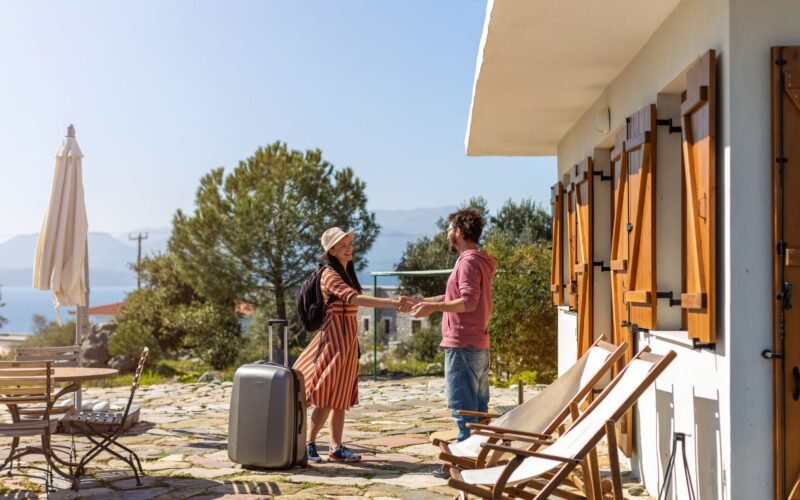|
Getting your Trinity Audio player ready...
|
Renting out your property on Airbnb and other short-term rental platforms can be a great way to generate income. However, doing so legally requires understanding local regulations, permits, and tax obligations. Depending on where your property is located, there may be strict rules in place to ensure your rental complies with local zoning laws, licensing requirements, and safety regulations.
In this guide, we’ll cover how to legally rent out your property on short-term rental platforms, the permits you may need, and tips for staying compliant with local laws.
Tip – If you’re wondering whether you need a business license for short-term rentals, check out our guide on whether you need a business license to rent.
Step 1: Understand Local Regulations for Short-Term Rentals
The first step to renting your property legally on platforms like Airbnb is understanding your local regulations. Many cities and counties have laws governing short-term rentals, and these regulations can vary significantly based on location.
Common Restrictions:
- Zoning Laws: Some cities restrict short-term rentals in residential areas or limit the number of rental days allowed per year. To learn more, see our article on how local zoning laws affect rental properties.
- Primary Residence Requirement: In certain areas, you can only rent out your primary residence for short-term stays. For example, you may need to live in the property for most of the year to qualify for a short-term rental permit.
Example Cities:
- San Francisco, CA: Requires hosts to register short-term rentals and limits the number of nights per year the property can be rented out.
- Paris, France: Limits short-term rentals to 120 days per year for primary residences.
Before listing your property, research the specific short-term rental laws in your city or town by visiting the local government’s website or contacting the zoning office.
Step 2: Obtain the Required Permits and Licenses
In many cities, you’ll need to apply for a short-term rental permit or business license before listing your property on platforms like Airbnb. The application process and fees can vary depending on your location.
How to Get a Permit:
- Check Local Requirements: Visit your local government’s website to find out what permits are needed for short-term rentals. Some cities offer an online application process, while others require in-person submission.
- Submit the Application: You may need to provide proof of ownership, floor plans, and payment of a registration fee.
- Pay Fees: The cost of obtaining a permit can range from $50 to $500 or more, depending on your city.
Once you have the required permits, you can legally list your property on Airbnb and similar platforms. Be sure to keep your permit up to date and renew it when necessary.
Step 3: Comply with Occupancy Taxes
In addition to permits and zoning requirements, most cities require short-term rental hosts to collect and remit occupancy taxes from guests. These taxes are similar to hotel taxes and are calculated based on the total amount charged for the stay.
How to Manage Occupancy Taxes:
- Airbnb’s Role: In many cities, Airbnb will automatically collect and remit occupancy taxes on behalf of hosts. However, it’s still important to verify this with your local tax authority.
- Self-Reporting: If your platform does not collect taxes for you, you’ll need to report and pay occupancy taxes to your local tax authority.
Staying compliant with local tax laws will help you avoid fines and ensure your short-term rental business operates smoothly.
Step 4: Meet Safety and Health Standards
Before renting out your property, you’ll need to ensure it meets safety and health standards. Many cities require short-term rental properties to pass inspections to verify that they meet local building codes, fire safety regulations, and other health and safety requirements.
Common Requirements:
- Smoke Detectors and Fire Extinguishers: Ensure the property has functional smoke detectors, carbon monoxide detectors, and fire extinguishers.
- Emergency Exits: The property should have clearly marked emergency exits and escape routes.
- Building Code Compliance: Verify that the property complies with local building codes, particularly if you’ve made renovations.
Some cities may require an inspection before granting a short-term rental permit, while others may perform random inspections to ensure compliance.
Step 5: Draft a Rental Agreement
A rental agreement helps protect both you and your guests by outlining the rules and expectations for the stay. While Airbnb and other platforms provide basic terms, having your own custom rental agreement can provide additional legal protection.
What to Include in Your Rental Agreement:
- Check-In and Check-Out Times: Specify when guests can arrive and depart.
- House Rules: Outline any specific rules, such as no smoking, no pets, or limits on the number of guests.
- Damage Policy: Clearly state your policy for damage or repairs, and explain how the security deposit will be handled.
Be sure to review your rental agreement with a legal expert to ensure it complies with local laws and protects your rights as a landlord.
Step 6: Insurance Coverage for Short-Term Rentals
Standard homeowner’s insurance policies typically don’t cover short-term rentals, so it’s important to secure the right insurance coverage. Airbnb offers Host Protection Insurance, but additional coverage may be needed.
Types of Insurance to Consider:
- Short-Term Rental Insurance: This type of insurance specifically covers damage, liability, and loss of income related to renting out your property.
- Liability Coverage: Make sure your insurance policy includes liability coverage in case a guest is injured on the property.
Contact your insurance provider to ensure you’re covered before listing your property on short-term rental platforms.
Step 7: Maintain Compliance with Local Laws
After setting up your short-term rental, it’s important to maintain compliance with all local laws, including renewing permits and licenses when necessary and staying within rental limits.
Tips for Staying Compliant:
- Track Rental Days: If your city imposes a limit on the number of days you can rent your property, keep accurate records to ensure you don’t exceed the limit.
- Renew Permits: Most cities require annual renewal of short-term rental permits, so be sure to stay on top of renewal deadlines.
- Stay Updated on Law Changes: Short-term rental laws are frequently updated, so regularly check your local government’s website for any changes that could affect your rental.
Frequently Asked Questions About Short-Term Rentals
Do I need a business license to rent my property on Airbnb?
Many cities require short-term rental hosts to obtain a business license or rental permit before listing their property. Check your local regulations.
How do I pay taxes on short-term rental income?
Occupancy taxes may be automatically collected by Airbnb, but you’ll need to report all rental income on your tax return and may need to pay local taxes.
Can I rent out my home while I’m away?
Yes, but make sure to check local laws regarding primary residence requirements and any limits on the number of rental days allowed.
Conclusion
Renting out your property on Airbnb and other short-term rental platforms can be a great source of income, but it’s important to follow local laws, obtain the necessary permits, and ensure your property meets health and safety standards. By staying compliant, collecting taxes, and drafting clear rental agreements, you can operate your short-term rental legally and profitably.
Always consult with local authorities and legal professionals to ensure you’re following the correct procedures and protecting yourself as a landlord.








